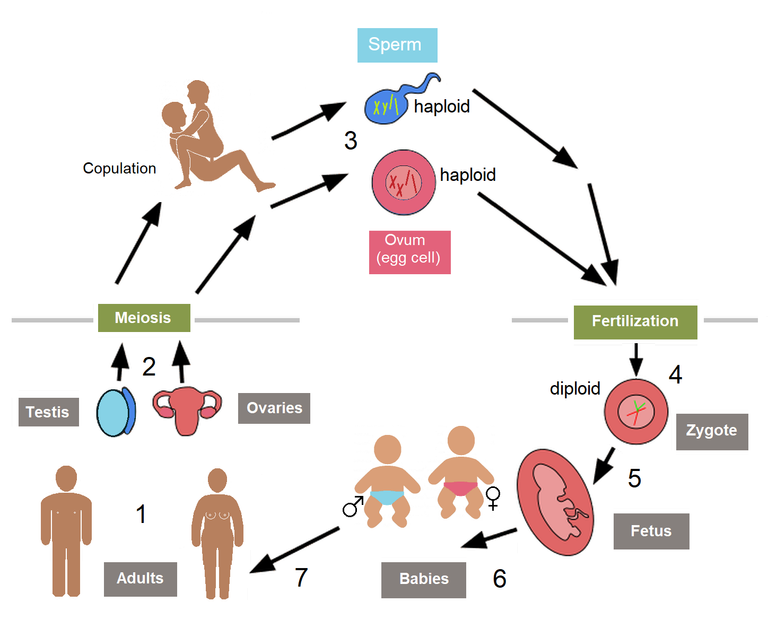Some people had a talk with their parent on Sex education while some didn't. Well, you cannot determine who your parents are or what information they are willing to share, but you can do better depending on what side you think is good. But in all of this, what is SEX?
The random Joe out there see sex as a requirement for reproduction. People just believe that sex is meant for reproduction but it is actually not the truth. For reproduction to occur, it has to do with passing genes from parents to offspring and there are a lot of organisms that reproduce and do not have to partake in the act of Sex. Since reproduction has to do with transferring information to offspring, there are options that can taken to get this done.
One is dividing and copying the genetic information to the offspring there creating a genetically identical offspring. The other is to undergo cell division, after which a potential mate is looked for then both parents donates 1/2 of their genetic makeup to create a genetically combined offspring. When we look at sex, it deals with the second aspect but then not even a major part of the method.
There are lots of organisms that do not require sex to reproduce such as microbes that bud off themselves and create new copies of themselves, flatworms just divides into two and start their lives all again, fungi reproduce by releasing spores so when we are talking about reproduction, and some animals even put to bed without a mating partner. Sex isn't going to meet the criteria for reproducing as it is not acquired for reproduction but we can say that it is still one of the biggest evolutionary unanswered questions when discussing evolutionary biology.

commons.wikimedia.org
So you know, biologically sex is expensive and when I say expensive I am not talking of the social effect it has on humans, I am talking biology. You see, for some organisms, finding a fitting male can be also disturbing and some organisms have grown to have both male and female part on themselves. Finding males are a little difficult and compared to asexual organisms that reproduces twice as fast as we, they do not really need much they just divide.
Sex is usually found in organisms that undergo meiosis,and each chromosomes swap DNA material with their partner in a term known as recombination/crossing over. The newly crossed-over partner splits so each sex cells have a singled mixed chromosome from both partners and recombination creates a more diversified offspring. So when it comes to sex gamate reproduction, it is slow and energy consuming.
There should be an upside for sex and that is genetic diversity which is not the same with asexual organisms who just get the genetic information copied and continue to do so for as long as existence exists for them. With sexual reproduction, the Red Queen hypothesis is possible as constant shuffling of genes are possible.
While we might want to say that sex evolved to create genetic diversity, it goes beyond that as sex evolved randomly and while it is still being researched and it has helped in evolution a lot. While sex is often thought to have evolved primarily to promote genetic diversity, its origins are more complex and still under research.
Sex plays a vital role in evolution, beyond just reproduction. Understanding the broader implications of sex in biology helps us appreciate its role in the diversity of life on Earth. Whether through sexual or asexual means, reproduction is a fascinating process that underscores the resilience and adaptability of living organisms.
Read More
https://www.blinkist.com/en/books/the-red-queen-en
https://pubmed.ncbi.nlm.nih.gov/28606425/
https://www.sciencedirect.com/science/article/abs/pii/S0169534717301295
https://www.ncbi.nlm.nih.gov/pmc/articles/PMC9345338/
https://byjus.com/biology/asexual-reproduction/
https://www.ncbi.nlm.nih.gov/pmc/articles/PMC6089407/
https://pubmed.ncbi.nlm.nih.gov/30233811/
https://www.sciencedirect.com/science/article/abs/pii/S0169534711002916
https://pubmed.ncbi.nlm.nih.gov/2961603/

Thanks for your contribution to the STEMsocial community. Feel free to join us on discord to get to know the rest of us!
Please consider delegating to the @stemsocial account (85% of the curation rewards are returned).
Thanks for including @stemsocial as a beneficiary, which gives you stronger support.